
English Channel Three: Double Identity

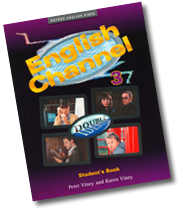 Videos like "English Channel" and "Only in America" are designed to be flexible. Each chapter has a clear teaching point. It can be identified with a major structural area such as the passives or reported speech. A lot more goes on as well, but this clarity of focus makes it easy to select appropriate video materials to go with whatever you are using.
Videos like "English Channel" and "Only in America" are designed to be flexible. Each chapter has a clear teaching point. It can be identified with a major structural area such as the passives or reported speech. A lot more goes on as well, but this clarity of focus makes it easy to select appropriate video materials to go with whatever you are using.
Which is more difficult in a foreign language? Understanding a person speaking (with gesture, body language, facial expression, background pictures) or understanding a telephone conversation? Listening is a vital skill, but students are doing it blindfolded without the visual information we get in real life. Students can follow a video story via the pictures, and are motivated to watch again to try to get more meaning from the material. They understand because so much of communication is non-verbal. Above all, classroom video gets students talking. It inspires more conversation than any other method. Surveys of students consistently reveal that it is the most popular stimulus. That is, as long as it is designed for a purpose, short, and interesting. Seven or eight minutes of video is enough for a 90 minute lesson
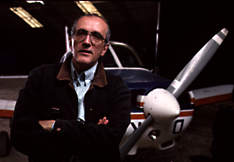 |
|
|
The Story
"English Channel Three" is a comedy thriller set in Oxford. Alan Penny (played by Steve Steen) is a librarian at Ethelred College, Oxford. When we meet him, we find out that he is short of money.
The college has just discovered an unknown Shakespeare play, "The Falcon of Malta" in its ancient storerooms, and Dr Burbage, the Master of the College wants Alan to take it for computer analysis. On the way, Alan is kidnapped. The kidnappers are led by Ingrid and Frankie . They think he is Professor Fanshawe, a famous biochemist, who happens to be his double.
It seems to Dr Burbage that Alan has run away with the manuscript, and the police are called in. Debbie, his friend and co-worker, is determined that Alan is innocent.
The plot follows Alan's escape with the help of Debbie . Not only does he have to keep out of the clutches of the gang, but he also has to recover the manuscript which he had left in a briefcase …
The locations in and around Oxford are stunning.
Why a story?
English Channel One and two consist of separate stories. We felt that the structural material we wanted to cover in Level Three lent itself best to a story, with all the work it involves in summarising the story so far and guessing the future direction of the plot.
This is a genuine pre-intermediate / intermediate course rather than yet anoother "false beginners" course. In other words it covers structures such as reporting, past perfect, passives, conditionals and speculation. These all work better with a continuing story.
The story is divided into eight episodes, each with a clear language focus.
The cast

 The cast was built around the English Channel 1 & 2 team, with Steve Steen as Alan / Professor Fanshawe and Jim Sweeney as the villain, Frankie.
The cast was built around the English Channel 1 & 2 team, with Steve Steen as Alan / Professor Fanshawe and Jim Sweeney as the villain, Frankie.
Steve is most familiar as Dennis Cook in Levels one and two. Steve had played multiple roles in "A Day In the Country" in level one where he plays five brothers.
Jim had a new short hair cut for his menacing role as Frankie. His appearance is completely different, and he combines menace with comedy.
 When we filmed "Ken's Kitchen" in English Channel One, we immediately wanted to do a script with Gabrielle Cowburn, Steve and Jim as they worked so well together. Gabrielle also played the mother in the Oakwood Avenue stories in Levels One and Two, and the manager in "An English Country Garden" from level two. Gabrielle is Debbie.
When we filmed "Ken's Kitchen" in English Channel One, we immediately wanted to do a script with Gabrielle Cowburn, Steve and Jim as they worked so well together. Gabrielle also played the mother in the Oakwood Avenue stories in Levels One and Two, and the manager in "An English Country Garden" from level two. Gabrielle is Debbie.
 Rebecca Egan plays the leading villain, Ingrid. This is a dramatic role reversal from Levels One and Two, where she plays the Police Superintendent.
Rebecca Egan plays the leading villain, Ingrid. This is a dramatic role reversal from Levels One and Two, where she plays the Police Superintendent.
 Martin Ball hadn't worked with us on "English Channel" before, though we knew him well from his TV work, such as the sitcom, "Keeping Mum". He plays Dr Burbage brilliantly.
Martin Ball hadn't worked with us on "English Channel" before, though we knew him well from his TV work, such as the sitcom, "Keeping Mum". He plays Dr Burbage brilliantly.


Terry (Terry Melia) and Mick (Anderson Knight), the other members of the gang both appear in Levels One and Two. Terry is the taxi driver in Level 1: Story One and the waiter in Level Two: Episode 7. Anderson appears in "Going, Going, Gone" in Level Two.
 Bruce Alexander who plays the Inspector is extremely familiar in the role, as he also plays the senior police officer in TV's "A Touch of Frost".
Bruce Alexander who plays the Inspector is extremely familiar in the role, as he also plays the senior police officer in TV's "A Touch of Frost".
 Simon Schatzenburger who plays the intelligent police sergeant, is the cyclist in "A Day in the Country" from level one, and also encounters Dennis Cook in both the earlier Dennis Cook stories.
Simon Schatzenburger who plays the intelligent police sergeant, is the cyclist in "A Day in the Country" from level one, and also encounters Dennis Cook in both the earlier Dennis Cook stories.

Cathryn Harrison is immediately familiar to viewers of the Grapevine videos, as well as from her many major roles on film and TV. Cathryn does a cameo performance in English Channel Three as Dr Alice Trim, an academic who is fascinated by Frankie.
 Rob Maidment directed and produced the whole series. Rob was the producer of all our other video series, and the producer / director of "Only in America"
Rob Maidment directed and produced the whole series. Rob was the producer of all our other video series, and the producer / director of "Only in America"

Martyn Hobbs was the script editor of the series.
The concept dates back to lunch with Rob and Martyn. We were discussing our other videos and how we had once planned the story of a missing Shakespeare manuscript. This was replaced by the story Bob Baker did for "Mystery Tour." We remembered that we'd never thought of a title for the fictional play, and I suddenly said "The Falcon of Malta". I'd been thinking of the classic film "The Maltese Falcon" by John Huston. From there we got onto film noire, and the advantages of a thriller story for the level.
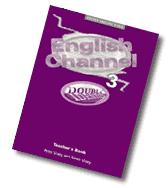
The Teacher's Book
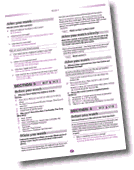 Enlarge |
Sample from Episode 2 |
|
The Story So Far, episode 1 |
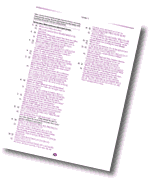 Enlarge |
"Double Identity" is a fictional story which takes place in a real location in and around Oxford. It is important to be aware of the border between fact and fiction in the story, particularly where students may go on to study literature. We would not want students to cite 'The Falcon of Malta' as a Shakesperean play in exams.
General facts about Shakespeare, The Civil War and the University of Oxford are true. We do not suggest communicating the information below to your students unless they are particularly interested!
THE FALCON OF MALTA
Not only did Shakespeare not write this play, but no similar play is known. The title echoes real plays like 'The Merchant of Venice,' 'Timon of Athens,' 'The Merry Wives of Windsor,' and 'Two Gentlemen of Verona'. As we hint on the INFORMATION page our actual inspiration was the classic film noire, 'The Maltese Falcon.' The information given about Maltese falcons being given as tributes is accurate - though in the movie there are mistakes. For example, they refer to the Holy Roman Emperor who received tributes of falcons 'The King of Spain' and date the tributes from 1539. They date from 1530, and at that time Charles V was both King of spain AND Holy Roman Emperor. The tribute was received in the latter role.
ETHELRED COLLEGE
Ethelred College does not exist. For anyone visiting Oxford, the exterior was filmed at the gateway (built 1509) to Brasenose College. The interiors were filmed at the Oxford Union Library (library scenes) and at Holywell Manor (Dr Burbage's office- which dates back to 1516). The latter two are not open to the public.
We named the college after the Saxon king, Ethelred the Unready. The college's Latin motto, "Semper Paratus" translates as "Always Ready.' This was a small in-joke. When we were filming it was noticed (and understood) by most of the Brasenose academic staff passing through the gate.
NEWTON COLLEGE
Newton College is fictional too. We wanted to give the idea that this was a scientific place full of computers, so named it after Sir Isaac Newton, the 17th century British scientist credited with the discovery of the laws of gravity. An apple fell on his head.
Newton College scenes were filmed in the modern part of St. John's College (much of the college is far older and can be seen in our video 'A Weekend Away').
THE COUNTRY HOUSE
This was filmed at the 18th century Kirtlington Park, near Oxford. It is not open to the public.
PLAYS AND THE CIVIL WAR
The story of the discovery of play should be reasonably credible (though fictional). Elizabethan and Jacobean drama was the golden age of English drama, and lasted only from 1576 to 1642. Shakespeare himself was only active as a writer between about 1590 and 1613. When the Civil War started, theatres were closed. The winning side, the Puritan "Roundheads" or Parliamentary side, believed that theatre was evil, and it was banned by the Puritans. (They also banned Christmas and other holidays, and dancing). The King's forces had fled to Oxford, where they established their capital city. It seemed reasonable (at least to us) that a play could have been hidden away in this period, and that Oxford rather than London could have been the location.
OTHER PLAYS BY SHAKESPEARE
Apart from "Pericles" (the 37th play) other plays have turned up which experts believe Shakespeare may have been involved in (e.g. The Yorkshire Tragedy). It is true that computers can help to establish date and authorship. Analysis indicates that Shakespeare's two final plays, 'Henry VIII' and 'Two Noble Kinsmen' were co-written with John Fletcher. A further play, 'Cardenio' by Shakespeare and Fletcher was performed in 1613 but no copies have ever been found. In 1998, researchers at Aston University revealed that their research showed that the early plays, 'Henry VI Part I' and 'Henry VI Part II' were actually co-written with Christopher Marlowe. Shakespeare had never acknowledged authorship of these.

1 Left: Episode 1, first page • Pre-tasks (Before you watch)
Left: Episode 7, Section 1 Before You Watch
• Watch the section • While you watch activity (optional)
Left: Episode 6, Section 1. While you watch / After you watch • Post-tasks (After you watch)
Left: Episode 4, Section 3, Before You watch, After you watch
English Channel Three: Double Identity - Student's Book
The Student's Book will take you through a thorough exploitation of the material. There will be pre-watching tasks, post-watching tasks and while-watching tasks. All of these will generate classroom conversation. At one time teachers feared that video would leave students in a passive role. This is quite wrong. This is teaching material designed to promote classroom interaction. It is NOT "comprehension" material like real movies or real TV. Having exploited the video, the Student's Books provide further material on the same topic which can be done later. The Student's Book has sub-syllabuses on communication skills, grammar, vocabulary, learner skills, reading, pronunciation.
The Student's Book contains for each of the eight episodes:
• Watching the Video
Four pages of activities for classroom exploitation. Though these could be done in a single classroom lesson, we recommend allowing a double lesson (90 to 100 minutes) for the exploitation of the video.
In general, the activities follow this format:
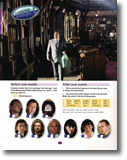
Enlarge
Viewing of the complete episode:
• Pre-tasks (Before you watch)
• Watch the whole episode
• Post-tasks (After you watch)
At this level, it is generally best to let students see the whole episode. If you are using the video at higher levels, you might choose to exploit it section by section without this initial global viewing. In units 7 and 8, where there is value in preserving the mystery, we suggest exploiting section by section without the initial viewing of the complete episode.
2
The episode is then divided into sections (usually four, though episode 7 has five sections) for detailed exploitation. Each section consists of:
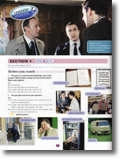
Enlarge

Enlarge
3
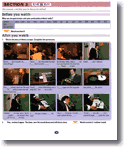
Enlarge
• Watch the whole episode again
It's most important to let students watch the whole episode again, so that they can feel how much their comprehension has increased as a result of the exploitation tasks. This may be followed by a post task.
4
• Detective work
This activity invites students to speculate on things which are not seen (but are implied) in the video.

• Extension.
This section can be used at any time during work on a particular video for reference, or later (without access to video equipment) as further exercises. The further exercises either have a Communication Skill or a Vocabulary biias. We put this on the fifth page of each unit as the words may be needed in subsequent work (especially Tell The story).
Left: Episode 1 Extension: background information • Exercises
The exercises will provide additional work based on the story of each episode. Right: Episode 4 Exercises • Reference
A complete language summary of each video for reference. These may be referred to if problems are experienced earlier in the video unit.
Left: Episode , Reference • The Story So Far
This is the sixth page of each video unit. It is a freer activity, and during it, students will be able to refer to the Vocabulary on the directly facing page. Right from video one, students will be able to say something about each picture. These pictures may also be used for various paired activities (see right). The Teacher's Book gives a number of model answers based on the structures and functions covered during the episode.
Right: Episode , The Story so Far
If you simply follow the activities suggested, you will have a thorough exploitation of the materials.
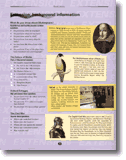
Enlarge
The Exercises are related to the story of the video, but can be done in a subsequent lesson, without access to video equipment. If time is short, the Exercises page can be done as homework.
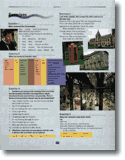
Enlarge
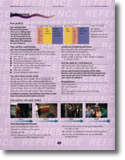
Enlarge
• Transcripts
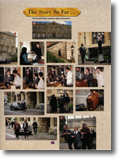
Enlarge
We recommend that these should not be used in class, but in our experience the great majority of students wish to have a transcript to which they can refer AFTER the lesson. We have found that students make copious notes and add translations to transcripts of videos, and this is usually done at home, on their own. Such extra work can only be advantageous, even though most experienced video teachers would opt strongly for discouraging their use before viewing.
Level
English Channel 3 has been designed at pre-intermediate / intermediate level. The video can be used at higher levels by amending the tasks. This is generally true of video material. The structural elements are listed below.
Contents
PROLOGUE
Prediction, speculation and deduction. Study skills.
EPISODE 1
Indirect questions and statements; present perfect continuous; reflexive and emphatic pronouns; Roman numerals; ought to; passive v active (reviewed). Extension: Background information
EPISODE 2
Relative pronouns; Introductory adverbs; what as a connector; shall; 'd better
Extension: Forms of address Communication skill: degrees of formality
EPISODE 3
Active and passive; indefinite pronouns; verb + infinitive; indefinite pronoun + infinitive; noun + infinitive; future continuous
Extension: Feelings Communication skill: expressing emotion
EPISODE 4
Past perfect; past perfect and past simple; past perfect continuous; where as a relative; two and three word verbs; will be able to / will have to
Extension: Newspaper reports Communication skill: comparing viewpoints
EPISODE 5
Conditional- type 1; conditional - type 2; If I were you … ; reporting (I thought … / I knew …); mathematics
Extension: Communication skill: presentations
EPISODE 6
Reported statements (say, tell); reported statements (said, told); reported wh- questions (asked); reported yes / no questions; reporting time words
Extension: Plot summary. Communication skill: summarising
EPISODE 7
Speculation, deduction; mustSeven or eightve been etc; it depends ; A friend of (mine) etc.
Extension: Appearance Communication skill: judging by appearance
EPISODE 8
Conditional form of modal verbs; would have done, should have done; conditional- type 3; should in formal style; intensifiers; although
Extension: What next?
Using English Channel on its own
English Channel may be used as a free-standing short course, taking anywhere between twenty four and forty eight classroom hours to complete.
A typical question is something like "I only have 32 (30, 36 …) hours for the entire course. I don't have space in that for video." When you look at the motivation video provides, you will want to find time. Another idea for a 36 hour course is to use only a video course. This seems radical, but in (e.g.) "English Channel" each episode has four pages in the Student Book for classroom exploitation of the video, but it also has four more pages of work which can be done in a room without a TV. You can easily base an entire short course around a video without extra materials.
It is ideal for short intensive courses with all age groups.
In a school situation, it may be useful as a short introductory course in situations where pupils have come from different schools or classes, and have differing levels of English. As a short, stimulating course it will help to consolidate a general body of knowledge. It may be also useful as material to complete a year's work.
Using English Channel as supplementary material
English Channel can be used as a supplement to any pre-intermediate / intermediate course. If it is done quickly, and extra discussion generated from the Teacher's notes it can be used at higher levels also.
We have been careful to ensure that the teaching points for each video are transparent. There is no continuing story, so that the order can be adapted to suit the progression of any course at the level.
The syllabus is based on Grapevine III and Main Street 5 and 6 by Peter Viney & Karen Viney. These have their own parallel video materials, but English Channel can be used instead of, or additionally to these.
Integration with Grapevine Videos
The same actors (Steve Steen & Jim Sweeney) appear in the Grapevine videos. The following integration chart may prove useful. The video unit numbers do not correspond as Grapevine videos were designed to precede each unit of five lessons, whereas English Channel was designed to follow each group of equivalent syllabus elements.
At this level, it is harder to equate more than the principal structural content. See the chart below. Minor points of structure will differ.
Main Teaching Point English Channel Three Grapevine Three General review of assumed knowledge - 1 Dennis Cook’s Party Indirect questions, statements Present perfect continuous 2 The Cricket Match Relative clauses with who, which, that 3 No Vacancies Passives in a variety of tenses 4 ETV South-West News Past perfect 5 Princess Calling Conditionals 1 & 2 6 A Glastonbury Tale Reported speech 7 Love in A Garden Deduction and speculation (must have done etc) 8 Eddie Barber- Private Eye Conditional type 3 -
|
| Books | Exercises | Videos | Resources | Home | ©Peter & Karen Viney 2004 |